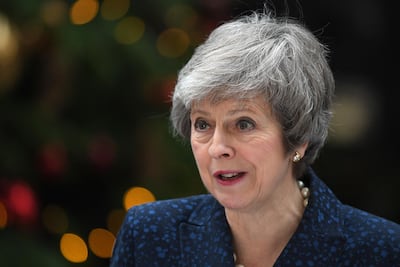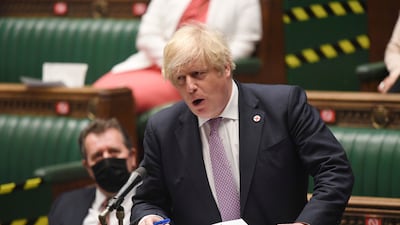UK Prime Minister Boris Johnson saw off a rebellion in Parliament on Tuesday and won backing for a contentious foreign aid cut.
Aid will remain at 0.5 per cent of Britain’s national income – down from the 0.7 per cent threshold in place until earlier this year – after MPs approved the government’s plan by 333 votes to 298.
Ministers said the cut of about about £4 billion ($5.53bn) was temporary and would revert to the previous level when public finances recover from Covid-19.
Critics say this could take years and believe the cut will damage Britain’s standing in the world and harm some of the world’s poorest people.
Danny Sriskandarajah, the chief executive of Oxfam GB, said the result of the vote was a "disaster for the world’s poorest people".
"These cuts won’t balance the books; the Government is putting politics above the lives of world’s most vulnerable communities," he said.
Rebels in Mr Johnson’s own Conservative ranks, including his predecessor Theresa May, had plotted to defeat the government in Tuesday’s vote and maintain the 0.7 per cent commitment.
“We made a promise to the poorest people in the world. The government has broken that promise,” Ms May said during a three-hour debate in the House of Commons.
The government sought to win over wavering MPs by promising that the 0.7 per cent threshold would return as soon as two key tests are met.
The arms-length Office for Budget Responsibility will assess whether the criteria of falling public debt and no more reliance on borrowing for day-to-day spending are being met.

Mr Johnson urged MPs to back him by insisting the UK was not “somehow retreating from the field of international development or lacking in global solidarity”.
“I can assure any honourable member who wishes to make the case for aid, that they are, when it comes to me or anyone in the government, preaching to the converted,” he said.
“When you’re suddenly compelled to spend £407bn on sheltering our people from an economic hurricane never experienced in living memory, there must inevitably be consequences for other areas of public spending.”
Britain’s Chancellor Rishi Sunak hinted at tax rises or spending cuts in other areas of public spending if the government lost the vote.
Keeping the threshold at 0.7 per cent would have “likely consequences for the fiscal situation, including for taxation and current public spending plans”, he said.
Opponents say the cut directly affects the welfare of vulnerable women and children, who Mr Johnson has described as a priority of Britain's G7 presidency this year.
Keir Starmer, the leader of the opposition Labour Party, said the cut was likely to last beyond the current Parliament, which is due to run until 2024.
“It matters that we keep our promises to the world’s poorest, particularly at such a time of global uncertainty,” he said.
He said cutting aid was a “false economy” because of the impact of development funds on reducing conflict and disease abroad.
Andrew Mitchell, a leader of the Conservative rebels, said the size of the foreign aid budget was already determined by the strength of the economy.
Reminding the government that its 0.7 per cent commitment was part of the Conservative manifesto at the last general election in 2019, he said: “It is, frankly, staggering that the only cut the government has made is to spending to help the poorest people on the planet in the middle of a pandemic.
“I am urging my colleagues to keep their promise and prevent hundreds of thousands of preventable deaths by voting against.”
Referring to the proposed double lock, he said: “Any of my colleagues who are satisfied by that, frankly, are being hoodwinked. If the government get their way today, we can kiss goodbye to 0.7.”


